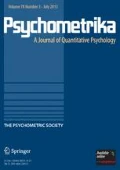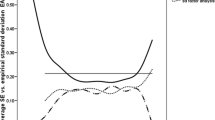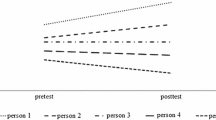Abstract
In the literature on the measurement of change,reliable change is usually determined by means of a confidence interval around an observed value of a statistic that estimates thetrue change. In recent literature on the efficacy of psychotherapies, attention has been particularly directed at the improvement of the estimation of the true change. Reliable Change Indices, incorporating thereliability-weighted measure of individual change, also known as Kelley's formula, have been proposed. According to current practice, these indices are defined as the ratio of such an estimator and an intuitively appealing criterion and then regarded as standard normally distributed statistics. However, because the authors fail to adopt an adequate standard error of the estimator, the statistical properties of their indices are unclear. In this article, it is shown that this can lead to paradoxical conclusions. The adjusted standard error is derived.
Similar content being viewed by others
References
Barkham, M., Rees, A., Stiles, W.B., Shapiro, D.A., Hardy, G.E., & Reynolds, S. (1996). Dose-effect relations in time-limited psychotherapy for depression.Journal of Consulting and Clinical Psychology, 64, 927–935.
Bruggemans, E., Van de Vijver, F.J.R., & Huysmans, H.A. (1997). Assessment of cognitive deterioration in individual patients following cardiac surgery: Correcting for measurement error and practice effects.Journal of Clinical and Experimental Neuropsychology, 19, 543–559.
Christensen, L., & Mendoza, J.L. (1986). A method of assessing change in a single subject: An alteration of the RC index.Behavior Therapy, 12, 305–308.
Cohen, J. (1977).Statistical power analysis for the behavioral sciences. New York: Academic Press.
Collins, L.M. (1996). Is reliability obsolete? A commentary on “Are simple gain scores obsolete?.”Applied Psychological Measurement, 20, 289–292.
Cronbach, L.J., & Furby, L. (1970). How we should measure “Change”—or should we?Psychological Bulletin, 74, 68–80.
Debats, D.L. (1996). Meaning in life—Clinical relevance and predictive power.British Journal of Clinical Psychology, 35, 503–516.
De Haan, E., Van Oppen, P., Van Balkom, A.J.L.M., Spinhoven, P., Hoogduin, K.A.L., & Van Dyck, R. (1997). Prediction of outcome and early vs. late improvement in Ocd patients treated with cognitive-behavior therapy and pharmacotherapy.Acta Psychiatrica Scandinavica, 96, 354–361.
Hafkenscheid, A.J.P.M. (1994).Rating scales in treatment efficacy studies: Individualized and normative use. Unpublished doctoral dissertation, Rijksuniversiteit Groningen, Groningen (the Netherlands).
Hageman, W.J.J.M., & Arrindell, W.A. (1993). A further refinement of the reliable change (RC) index byImproving the pre-postDifference score: IntroducingRC ID .Behaviour Research and Therapy, 31, 693–700.
Hsu, L.M. (1989). Reliable changes in psychotherapy: Taking into account regression toward the mean.Behavioral Assessment, 11, 459–467.
Jacobson, N.S., Follette, W.C., & Revenstorf, D. (1984). Psychotherapy outcome research: Methods for reporting variability and evaluating clinical significance.Behavior Therapy, 15, 336–352.
Jacobson, N.S., & Truax, P. (1991). Clinical significance: A statistical approach to defining meaningful change in psychotherapy research.Journal of Clinical and Consulting Psychology, 59, 12–19.
Kelley, T.L. (1947).Fundamentals of statistics. Cambridge: Harvard University Press.
Lord, F.M., & Novick, M.R. (1968).Statistical theories of mental test scores. Reading, MA: Addison-Wesley.
McNemar, Q. (1958). On growth measurement.Educational and Psychological Measurement, 18, 47–55.
McNemar, Q. (1962).Psychological statistics (3rd ed.). New York: Wiley.
McNemar, Q. (1969).Psychological statistics (4th ed.). New York: Wiley.
Mellenbergh, G.J. (1999). A note on simple gain score precision.Applied Psychological Measurement, 23, 87–89.
Nunnally, J.C., & Kotsch, W.E. (1983). Studies of individual subjects: logic and methods of analysis.British Journal of Clinical Psychology, 22, 83–93.
Ostrom, Th.M. (1966). Perspective as an intervening construct in the judgment of attitude statements.Journal of Personality and Social Psychology, 3, 135–144.
Plewis, I. (1985).Analysing change. Chichester: Wiley.
Rao, C.R. (1973).Linear statistical inference and its applications. New York: Wiley.
Rogosa, D., Brandt, D., & Zimowski, M. (1982). A growth curve approach to the measurement of change.Psychological Bulletin, 92, 726–748.
Rudy, T.E., Turk, D.C., Kubinski, J.A., & Zaki, H.S. (1995). Differential treatment responses of Tmd patients as a function of psychological characteristics.Pain, 61, 103–112.
Sharma, K.K., & Gupta, J.K. (1986). Optimum reliability of gain scores.Journal of Experimental Education, 54, 105–108.
Smith, M.L., Glass, G.V., & Miller, Th.I. (1980).The Benefits of Psychotherapy. Baltimore: John Hopkins University Press.
Speer, D.C. (1992). Clinically significant change: Jacobson and Truax (1991) revisited.Journal of Consulting and Clinical Psychology, 60, 402–408.
Taylor, S. (1995). Assessment of obsessions and compulsions—Reliability, validity and sensitivity to treatment effects.Clinical Psychology Review, 15, 261–296.
Upshaw, H.S., & Ostrom, Th.M. (1984). Psychological perspective in attitude research. In J.R. Eiser (Ed.),Attitudinal judgment. New York: Springer.
Van Oppen, P., De Haan, E., Van Balkom, A.J.L.M., Spinhoven, P., Hoogduin, K., & Van Dyck, R. (1995). Cognitive therapy and exposure in-vivo in the treatment of obsessive-compulsive disorder.Behaviour Research and Therapy, 33, 379–390.
Willett, J.B. (1988). Questions and answers in the measurement of change. In E.Z. Rothkopf (Ed.),Review of research in education, Vol. 15, 1988–89, pp. 345–422. Washington: American Educational Research Association.
Willett, J.B. (1989). Some results on reliability for the longitudinal measure of change: Implications for the design of studies of individual growth.Educational and Psychological Measurement, 49, 587–602.
Williams, R.H., & Zimmerman, D.W. (1996). Are simple gain scores obsolete?Applied Psychological Measurement, 20, 59–69.
Wykes, T. (1998). What are we changing with neurocognitive rehabilitation—Illustrations from 2 single cases of changes in neuropsychological performance and brain systems as measured by SPECT.Schizophrenia Research, 34, 77–86.
Zimmerman, D.W., & Williams, R.H. (1982). Gain scores in research can be highly reliable.Journal of Educational Measurement, 19, 149–154.
Author information
Authors and Affiliations
Corresponding author
Rights and permissions
About this article
Cite this article
Maassen, G.H. Kelley's formula as a basis for the assessment of reliable change. Psychometrika 65, 187–197 (2000). https://doi.org/10.1007/BF02294373
Received:
Revised:
Issue Date:
DOI: https://doi.org/10.1007/BF02294373




